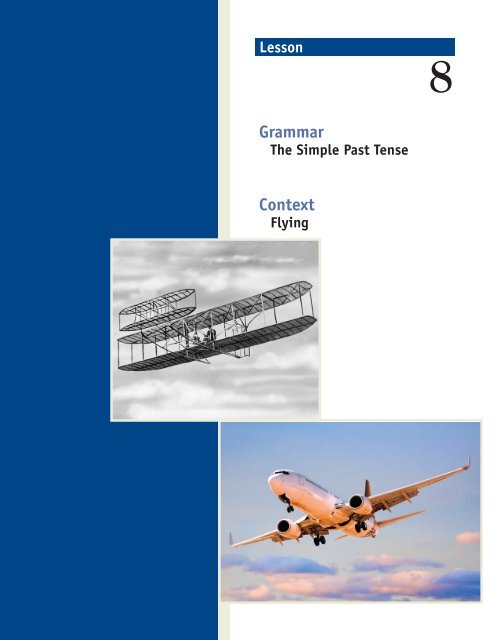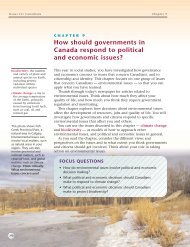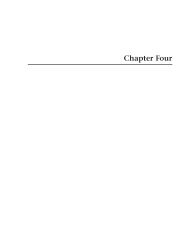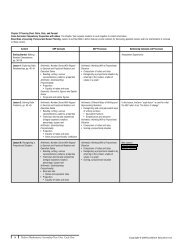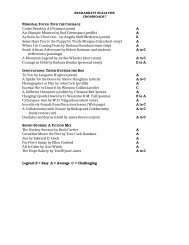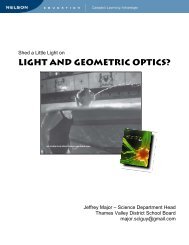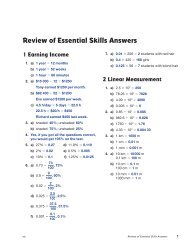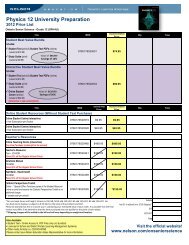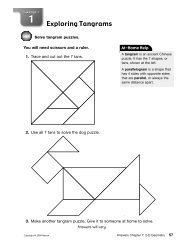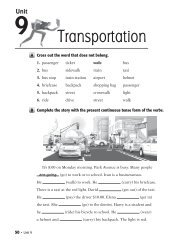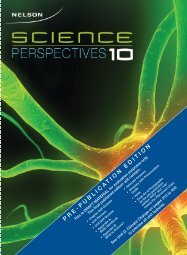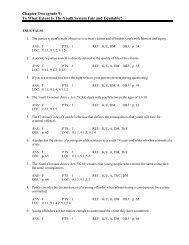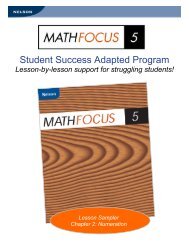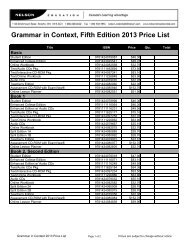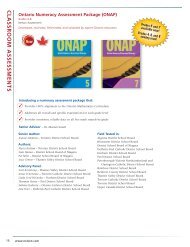You also want an ePaper? Increase the reach of your titles
YUMPU automatically turns print PDFs into web optimized ePapers that Google loves.
Lesson8GrammarThe Simple Past TenseContextFlying
8.1 The Simple Past Tense of Regular VerbsEXAMPLESThe Wright brothers started a bicycle business.They dreamed about flying.They designed an airplane.The president offered them a contract.The Wright brothers wanted to fl y .They continued to study aerodynamics.The Wright brothers invented the airplaneover 100 years ago.We celebrated the 100th anniversary of flighta few years ago.EXPLANATIONTo form the simple past tense of regularverbs, we add -ed to the base form.Base FormPast FormstartstarteddreamdreameddesigndesignedofferofferedThe past form is the same for all persons.The verb after to does not use the pastform.We often use ago in sentences about thepast. Ago means before now.EXERCISEEXAMPLERead more about the Wright brothers. Underline the past tenseverbs in the following sentences.The Wright brothers lived in Dayton, Ohio.1. Their father worked as a Christian minister.2. The boys learned mechanical things quickly.3. They loved bicycles.4. They opened the Wright Cycle Company repair shop, where theyrepaired bicycles.5. They started to produce their own bicycle models.6. The first airplane weighed over 600 pounds.7. They succeeded in flying the first airplane in 1903.8. Wilbur died nine years later, of typhoid. 49. Orville lived to be 76 years old.4Typhoid is a serious infection causing a fever and often death.The Simple Past Tense 225
8.2 Spelling of the Past Tense of Regular VerbsRULE BASE FORM PAST FORMAdd -ed to most regular verbs.When the base form ends in e, add -d only.When the base form ends in a consonant + y, change yto i and add -ed.When the base form ends in a vowel + y, add -ed.Do not change the y.When a one-syllable verb ends in a consonant-vowelconsonant,double the final consonant and add -ed.Do not double a final w or x.When a two-syllable verb ends in a consonant-vowelconsonant,double the final consonant and add -edonly if the last syllable is stressed.When the last syllable of a two-syllable verb is notstressed, do not double the final consonant.startraindielivecarrystudystayenjoystophugshowfi xoccúrpermítópenófferstartedraineddiedlivedcarriedstudiedstayedenjoyedstoppedhuggedshowedfi x edoccurredpermittedopenedofferedEXERCISEEXAMPLESWrite the past tense of these regular verbs. (Accent marks show youwhere a word is stressed.)learn learned clap clappedlove loved lísten listened1. play 11. enjoy2. study 12. drag3. decide 13. drop4. want 14. start5. like 15. follow6. show 16. prefér7. look 17. like8. stop 18. mix9. háppen 19. admít10. carry 20. propél226 Lesson 8
8.3 Pronunciation of -ed Past FormsPRONUNCIATION RULE EXAMPLES/t/Pronounce /t/ after voicelesssounds: /p, k, f, s, š, č/jump—jumpedcook—cookedcough—coughed/d/ePronounce /d/ after voicedsounds: /b, g, v, d¯, z, ž, ǰ, m,n, ŋ, l, r/ and all vowelsounds./ d/ Pronounce / d/ after /d/ or/t/ sounds.erub—rubbeddrag—draggedlove—lovedbathe—batheduse—usedmassage—massagedcharge—chargedwait—waitedhate—hatedwant—wantedkiss—kissedwash—washedwatch—watchedname—namedlearn—learnedbang—bangedcall—calledcare—caredfree—freedadd—addeddecide—decidedEXERCISE 3Go back to Exercise 2 and pronounce the base form and past form ofeach verb.EXERCISE 4EXAMPLEFill in the blanks with the past tense of the verb in parentheses ( ).Use the correct spelling.The Wright brothers received a flying toy from their father.(receive)1. They with kites.(play)2. They about flying.(dream)3. They everything they could about flying.(study)4. They a bicycle business.(start)5. They the bicycle shop to design airplanes.(use)6. They to fly their first plane in 1899.(try)7. Their first plane .(crash)8. They it.(fix)9. In 1903, their plane in the air for 12 seconds.(stay)10. They their invention to the U.S. government.(offer)11. The government to offer them a contract.(decide)(continued)The Simple Past Tense 227
12. Wilbur Wright in 1912.(die)13. Orville Wright for many more years.(live)14. Their invention the world.(change)Charles Lindbergh and Amelia EarhartBeforeYou ReadCD 2, TR 021. When was the first time you traveled by airplane?2. Do you recognize the people in the photos below?Read the following textbook article. Pay special attention to thepast-tense forms of be.Charles Lindbergh,1902–1974At the beginning of the twentieth century,flight was new. It was not for everyone. It was onlyfor the brave and adventurous. Two adventurerswere Charles Lindbergh and Amelia Earhart.Charles Lindbergh loved to fly. He was bornin 1902, one year before the Wright brothers’historic flight. In 1927, a man offered a $25,000reward for the first person to fly from New Yorkto Paris nonstop. Lindbergh was a pilot for the<strong>Unit</strong>ed States Mail Service at that time. Hewanted to win the prize.He became famous because he was the first personto fly alone across the Atlantic Ocean. His planewas in the air for 33 hours. The distance of theflight was 3,600 miles. There were thousands ofpeople in New York to welcome him home. Hewas an American hero. He was only 25 years old.Another famous American aviator 5 was AmeliaEarhart. She was the first woman to fly acrossthe Atlantic Ocean alone. She was 34 years old.Americans were in love with Earhart. In 1937,however, she was on a flight around the worldwhen her plane disappeared somewhere in the Pacific Ocean.No one really knows what happened to Earhart.Amelia Earhart,1897–19375Aviator means pilot.228 Lesson 8
8.4 Past Tense of BeThe verb be has two forms in the past: was and were.EXAMPLESSubject Was ComplementIinterested in the story.Charlesa pilot.Hebrave.Amelia was a pilot too.Shepopular.The airplane new in 1903.Itin the air for 12 seconds.Subject Were ComplementWeinterested in the story.Youin class yesterday.wereAmelia and Charles brave.Theyadventurous.There Was Singular SubjectThere was a celebration in 2003.There Were Plural SubjectThere were thousands of people.Charles Lindbergh was not the first person to fly.We were not at the 2003 celebration.I wasn’t here yesterday.You weren’t in class yesterday.EXPLANATIONIHeSheItsingular subjectWeYouTheyplural subjectwaswereThere + was + singular nounThere + were + plural nounTo make a negative statement, putnot after was or were.∂∂The contraction for was not is wasn’t.The contraction for were not is weren’t.EXERCISE 5EXAMPLEFill in the blanks with was or were.Lindbergh and Earhart were very famous.1. The Wright brothers the inventors of the airplane.2. The first airplane in the air for 12 seconds.3. Lindbergh and Earhart aviators.4. There thousands of people in New York to welcomeLindbergh home.5. Earhart the first woman to fly across the Atlantic Ocean.6. I interested in the story about Earhart and Lindbergh.7. you surprised that a woman was a famous aviator?8. Lindbergh in Paris.9. We happy to read about flight.10. There a celebration of 100 years of flight in 2003.11. There thousands of people at the celebration.The Simple Past Tense 229
8.5 Uses of BeEXAMPLESLindbergh was an aviator.Lindbergh was brave.Lindbergh was in Paris.Earhart was from Kansas.She was born in 1897.There were thousands of people in New Yorkto welcome Lindbergh.Lindbergh was 25 years old in 1927.EXPLANATIONClassification of the subjectDescription of the subjectLocation of the subjectPlace of origin of the subjectWith bornWith thereWith ageEXERCISE 6EXAMPLERead each statement. Then write a negative statement with thewords in parentheses ( ).The Wright brothers were inventors. (Earhart and Lindbergh)Earhart and Lindbergh weren’t inventors.1. The train was common transportation in the early 1900s. (the airplane)2. Earhart was from Kansas. (Lindbergh)3. Lindbergh’s last flight was successful. (Earhart’s last flight)4. Lindbergh’s plane was in the air for many hours. (the Wright brothers’first plane)5. The Wright brothers were inventors. (Earhart)6. There were a lot of trains 100 years ago. (planes)7. Lindbergh was born in the twentieth century. (the Wright brothers)8. The 1903 flight at Kitty Hawk was successful. (the 2003 flight)230 Lesson 8
8.6 Questions with Was/WereEXAMPLESWas the first flight long?No, it wasn’t.Was the first flight successful?Yes, it was.Were the Wright brothers inventors?Yes, they were.Were there a lot of people at the 100-year celebration?Yes, there were.Was there a lot of rain that day?Yes, there was.How long was the first flight?Where was the first flight?Why wasn’t Amelia successful?Why weren’t you there?Who was with Earhart when she disappeared?How many people were in the airplane?EXPLANATIONYes/No QuestionsWas/were + subject . . . ?Short answersYes, + subject + was/were.No, + subject + wasn’t/weren’t.There QuestionsWas/were + there . . . ?Short AnswersYes, there was/were.No, there wasn’t/weren’t.Wh- QuestionsWh- word + was/were + subject . . . ?Negative QuestionsWhy + wasn’t/weren’t + subject . . . ?Subject QuestionsWho + was . . . ?How many . . . + were . . . ?Compare affirmative statements and questions.Wh- Word Was/Were Subject Was/Were Complement Short AnswerAmelia was born before 1903.Was she born in the U.S.? Yes, she was.When was she born? In 1897.Charles and Amelia were famous.Were they inventors? No, they weren’t.Someone was with Amelia.Who was with Amelia? A copilot.Many people were at the celebration.How many people were at the celebration? Thousands.Compare negative statements and questions.Wh- Word Wasn’t/Weren’t Subject Wasn’t/Weren’t ComplementAir travel wasn’t safe 100 years ago.Why wasn’t it safe?The Wright brothers weren’t afraid of flying.Why weren’t they afraid?The Simple Past Tense 231
EXERCISE 7EXAMPLERead each statement. Then write a yes/no question with the wordsin parentheses ( ). Give a short answer.The Wright brothers were inventors. (Lindbergh)Was Lindbergh an inventor? No, he wasn’t.1. The airplane was an important invention. (the telephone)2. Thomas Edison was an inventor. (the Wright brothers)3. Amelia Earhart was American. (Lindbergh)4. Travel by plane is common now. (100 years ago)5. There were telephones 100 years ago. (airplanes)6. You are in class today. (yesterday)7. I was interested in the story about the aviators. (you)8. I wasn’t born in the U.S. (you)EXERCISE 8ABOUT YOU Interview a classmate who is from another country.1. Where were you born?2. Were you happy or sad when you left your country?3. Who was with you on your trip?4. Were you happy or sad when you arrived?5. What was your first impression of your new home?6. Were you tired when you arrived?7. Who was at the airport to meet you?8. How was the weather on the day you arrived?232 Lesson 8
EXERCISE 9EXAMPLERead each statement. Then write a wh- question with the words inparentheses ( ). Answer the question.Lindbergh was very famous. (why)A: Why was Lindbergh famous?B: He was one of the first aviators.1. Lindbergh was a hero. (why)A:B:2. Lindbergh was American. (what nationality/Earhart)A:B:3. Earhart was 34 years old when she crossed the ocean. (how old/Lindbergh)A:B:4. Lindbergh was a famous aviator. (who/the Wright brothers)A:B:5. Lindbergh was born in 1902. (when/Earhart)A:B:6. The Wright brothers were famous. (why)A:B:7. The flight at Kitty Hawk in 2003 wasn’t successful. (why)A:B:EXERCISE 10CD 2, TR 03Fill in the blanks with the correct past-tense form of be. Add anyother necessary words.A: I tried to call you last weekend. I was worried about you.(example)B: I home. I out of town.(1 not) (2)A: Where ?(3)B: In Washington, D.C.A: alone?(4)(continued)The Simple Past Tense 233
National Air and Space MuseumB: No, I . I was with my brother.(5)A: expensive?(6)B: No. Our trip wasn’t expensive at all.A: Really? Why expensive?(7)B: The flight from here to Washington cheap.(8)And we stayed with some friends in their apartment.Theyvery helpful. They showed us a lot of beautiful(9)places in Washington. But my favorite place was the Air andSpace Museum.A: a lot of people at the museum?(10)B: Yes, there were. It very crowded. But it(11) (12)wonderful to see the Wright brothers’ airplane and the airplane thatLindbergh used when he crossed the Atlantic. Also itinteresting to see the spacecraft of the astronauts. Webored for one minute in that museum.(13)(14 not)A: How long your flight to Washington?(15)B: It only 2 hours and 15 minutes from here. We don’t think(16)about flying as anything special anymore. But just a little over100 years ago, flight just a dream of two brothers.(17)Can you believe it? Thereonly 66 years between the first(18)flight in 1903 and the trip to the moon in 1969!A: That’s amazing!8.7 Simple Past Tense of Irregular Verbs—An OverviewEXAMPLESI came to the U.S. by plane.My flight took six hours.I felt happy when I arrived.EXPLANATIONMany verbs are irregular in the past tense.An irregular verb does not use the -edending.234 Lesson 8
Robert GoddardBeforeYou Read1. Did you ever see the first moon landing in 1969?2. Are you interested in astronauts and rockets?CD 2, TR 04Read the following textbook article. Pay special attention topast-tense verbs.Did YouKnow?The first womanin space was aRussian, ValentinaTereshkova, in1963.Robert Goddard with earlyrocket, 1926Robert Goddard was born in 1882. Whenhe was a child, he became interested infirecrackers and thought about the possibilityof space travel. He later became a physicsprofessor at a university. In his free time, hebuilt rockets and took them to a field, butthey didn’t fly. When he went back to hisuniversity after his failed attempts, the otherprofessors laughed at him.In 1920, Goddard wrote an article aboutrocket travel. He believed that one day itwould be possible to go to the moon. WhenThe New York Times saw his article, a reporter wrote that Goddard had lessknowledge about science than a high schoolstudent. Goddard wanted to prove that TheNew York Times was wrong.In 1926, he built a ten-foot rocket, putit into an open car, and drove to his aunt’snearby farm. He put the rocket in a fieldand lit the fuse. Suddenly the rocket wentinto the sky. It traveled at 60 miles per hour(mph) to an altitude of 41 feet. Then it fellAstronaut Buzz Aldrin ofApollo 11 on the moon, 1969into the field. The flight lasted 2½ seconds, but Goddard was happy abouthis achievement. Over the years, his rockets grew to 18 feet and flew to9,000 feet in the air. No one made fun of him after he was successful.When Goddard died in 1945, his work did not stop. Scientistscontinued to build bigger and better rockets. In 1969, when the Americanrocket Apollo 11 took the first men to the moon, The New York Timeswrote: “The Times regrets 6 the error.”6Regret means to be sorry for.The Simple Past Tense 235
8.8 List of Irregular Past Tense Verbs 7VERBS WITH NO CHANGEFINAL d CHANGES TO tbet—betcost—costcut—cutfit—fithit—hithurt—hurtlet—letput—putquit—quitshut—shutbend—bentbuild—builtlend—lentsend—sentspend—spentVERBS WITH A VOWEL CHANGEfeel—feltlose—lostkeep—kept mean—meant 8leave—leftsleep—sleptbreak—brokechoose—chosefreeze—frozedig—dughang—hungblow—blewdraw—drewfly—flewsteal—stolespeak—spokewake—wokespin—spunwin—wongrow—grewknow—knewthrow—threwbring—broughtbuy—boughtcatch—caughtbegin—begandrink—drankring—rangdrive—droveride—rodefight—foughtteach—taughtthink—thoughtsing—sangsink—sankswim—swamshine—shonewrite—wrotebleed—bledmeet—metfeed—fed read—read 9lead—ledsell—sold tell—told find—found wind—woundshake—shooktake—tookmistake—mistooklay—laidsay—said 10pay—paidtear—tore wear—wore bite—bit hide—hidlight—litbecome—becamecome—cameeat—atefall—fellhold—heldgive—gaveforgive—forgavelie—layrun—ransit—satsee—sawforget—forgotshoot—shotget—gotstand—stoodunderstand—understoodMISCELLANEOUS CHANGESbe—was/weredo—didgo—wenthave—hadhear—heardmake—made7For an alphabetical list of irregular verbs, see Appendix D.8There is a change in the vowel sound. Meant rhymes with sent.9The past form of read is pronounced like the color red.10Said rhymes with bed.236 Lesson 8
EXERCISE 11EXAMPLERead the following facts about the history of rockets. Underline theverbs. Write R for a regular verb. Write I for an irregular verb.Goddard published a paper on rockets in 1920. R1. Goddard built and flew rockets from 1926 to 1939.2. Germany used the first rockets in World War II in 1944.3. The Russians launched their first satellite, Sputnik 1, in 1957.4. The Americans sent up their first satellite, Explorer 1, in 1958.5. Yuri Gagarin, a Russian, became the first person in space in 1961.6. Alan Shepard, an American, went into space in 1961.7. The <strong>Unit</strong>ed States put the first men on the moon in 1969.8. A spacecraft on Mars transmitted color photos to Earth in 2004.EXERCISE 12Fill in the blanks with the past tense of one of the words from thebox below.flywritethinkputdrivebecomebeseefallEXAMPLEGoddard became interested in rockets when he was a child.1. He a professor of physics.2. People that space travel was impossible.3. Goddard his first rocket in a car and to hisaunt’s farm.4. The rocket for 2½ seconds and then it tothe ground.5. Goddard never the first moon landing.6. The New York Times about their mistake 49 years later.EXERCISE 13EXAMPLEFill in the blanks with the past tense of the verb in parentheses ( ).The Wright brothers’ father gave them a flying toy.(give)1. They a dream of flying.(have)2. They interested in flying after seeing a flying toy.(become)3. They many books on flight.(read)(continued)The Simple Past Tense 237
4. They bicycles.(sell)5. They the first airplane.(build)6. At first they problems with wind.(have)7. They some changes to the airplane.(make)8. They for the first time in 1903.(fly)9. Only a few people the first flight.(see)10. President Theodore Roosevelt about their airplane.(hear)11. The airplane was an important invention because itpeople from different places closer together.(bring)12. Thousands of people to North Carolina for the 100th(go)anniversary of flight.8.9 Negative Forms of Past Tense VerbsCompare affirmative (A) and negative (N) statements with past-tense verbs.EXAMPLESA. Lindbergh returned from his last flight.N. Earhart didn’t return from her last flight.A. The Wright brothers fl e w in their airplane.N. Goddard didn’t fly in his rocket.A. Goddard built rockets.N. He didn’t build airplanes.A. The Russians put a woman in space in 1963.N. The Americans didn’t put a woman inspace until 1983.EXPLANATIONFor the negative past tense, we usedidn’t + the base form for ALL verbs,regular and irregular.Compare:returned—didn’t returnflew—didn’t flybuilt—didn’t buildput—didn’t putRemember: Put and a few other past-tenseverbs are the same as the base form.238 Lesson 8
EXERCISE 14EXAMPLEFill in the blanks with the negative form of the underlined words.Goddard believed in space flight. Other people didn’t believein space flight at that time.1. The Wright brothers dreamed about flying. Theyabout rockets.2. They sold bicycles. They cars.3. Their 1903 airplane had a pilot. Their first airplanea pilot.4. The Wright brothers wanted to show their airplane to the U.S.government. The government5. The Wright brothers built the first airplane. Theythe first rocket.6. Goddard thought his ideas were important. His colleagueshis ideas were important.to see it at first.7. He wanted to build rockets. He to buildairplanes.8. In 1920, a newspaper wrote that he was foolish. The newspaperabout the possibility of rocket travel.9. In 1926 his rocket flew. Before that time, his rockets10. The first rocket stayed in the air for 2½ seconds. It.in the air for a long time.11. Goddard saw his rockets fly. He rockets go tothe moon.12. In 1957, the Russians put the first man in space. The Americansthe first man in space.13. In 1969, the first Americans walked on the moon. Russianson the moon.14. A rocket went to the moon in 1969. A rocketto the moon during Goddard’s lifetime.The Simple Past Tense 239
EXERCISE 15EXAMPLESABOUT YOU If you came to the U.S. from another country, fillin the blanks with the affirmative or negative form of the verb inparentheses to tell about the time before you came to the U.S. Addsome specific information to tell more about each item.I studied English before I came to the U.S. I studied with a(study)private teacher for three months.ORI didn’t study English before I came to the U.S. I didn’t have(study)enough time.1. I my money for dollars before I came to(exchange)the U.S.2. I a passport.(get)3. I for a visa.(apply)4. I English.(study)5. I my furniture.(sell)6. I goodbye to my friends.(say)7. I an English dictionary.(buy)8. I a clear idea about life in the U.S.(have)9. I afraid about my future.(be)10. I to another country first.(go)11. I English well.(understand)12. I a lot about American life.(know)240 Lesson 8
EXERCISE 16EXAMPLEABOUT YOU If you come from another city or country, tell if thesethings happened or didn’t happen after you moved to this city.Add some specific information to tell more about each item.find an apartmentI found an apartment two weeks after I arrived in this city.ORI didn’t find an apartment right away. I lived with my cousins fortwo months.1. find a job 6. go to the bank2. register for English classes 7. visit a museum3. rent an apartment 8. see a relative4. buy a car 9. buy clothes5. get a Social Security card 10. get a driver’s licenseEXERCISE 17EXAMPLEABOUT YOU Tell if you did or didn’t do these things in the pastweek. Add some specific information to tell more about each item.go to the moviesI went to the movies last weekend with my brother. We saw a great movie.ORI didn’t go to the movies this week. I didn’t have time.1. use the Internet 7. buy a magazine2. write a letter 8. work hard3. go to the library 9. look for a job4. do laundry 10. rent a DVD5. buy groceries 11. send e-mail6. use a phone card 12. read a newspaperThe Simple Past Tense 241
Hero PilotBeforeYou ReadCD 2, TR 051. Do you think that plane travel is safe?2. Do you know of any heroes?Read the following conversation. Pay special attention to past-tensequestions.Chesley Sullenberger, pilot of Flight 154911A flock of birds is a group of birds that fly together.242 Lesson 8
8.10 Questions with Past-Tense VerbsCompare affirmative statements and questions.Wh- Word Did Subject Verb Complement Short AnswerThe pilot landed the plane.Did he land at an airport?Where did he land?The plane lost power.Did the plane lose an engine?How did it lose an engine?No, he didn’t.On the Hudson River.Yes, it did.Birds flew into the engine.Language Notes:1. To form a yes/no question, use:Did + subject + base form + complement2. To form a short answer, use:Yes, + subject pronoun + did.No, + subject pronoun + didn’t.3. To form a wh- question, use:Wh- word + did + subject + base form + complementCompare negative statements and questions.Wh- word Didn’t Subject Verb ComplementWhyDidn’tdidn’tThe pilothehedidn’t gogogoto the airport.back?back to theairport?EXERCISE 18EXAMPLERead the questions and answer with a short answer.Did you read about the pilot? Yes, I did.1. Did the pilot return to the airport?2. Did he make the right decision?3. Did any of the passengers die?4. Did the plane go into the river?5. Was the pilot brave?The Simple Past Tense 243
EXERCISE 19ABOUT YOU Use these questions to ask another student about thetime when he or she lived in his or her native country.1. Did you study English in your country?2. Did you live in a big city?3. Did you live with your parents?4. Did you know a lot about the U.S.?5. Did you finish high school?6. Did you own a car?7. Did you have a job?8. Did you think about your future?9. Were you happy?EXERCISE 20EXAMPLERead each statement. Write a yes/no question about the words inparentheses ( ). Write a short answer.The Wright brothers had a dream. (Goddard) (yes)Did Goddard have a dream? Yes, he did.1. Wilbur Wright died in 1912. (his brother) (no)2. The Wright brothers built an airplane. (Goddard) (no)3. Earhart loved to fly. (Lindbergh) (yes)4. Lindbergh crossed the ocean. (Earhart) (yes)5. Lindbergh worked for the U.S. Mail Service. (Earhart) (no)6. Lindbergh became famous. (Earhart) (yes)7. Earhart disappeared. (Lindbergh) (no)8. Lindbergh was born in the twentieth century. (Earhart) (no)244 Lesson 8
9. Lindbergh won money for his flight. (the Wright brothers) (no)10. People didn’t believe the Wright brothers at first. (Goddard) (no)11. The Wright brothers dreamed about flight. (Goddard) (yes)12. Sully made an emergency landing. (a safe landing) (yes)13. Birds flew into one engine. (both engines) (no)14. Sully was safe. (the passengers) (yes)EXERCISE 21EXAMPLEFill in the blanks with the correct words.What kind of engine did the first airplane have? ?The first airplane had a gasoline engine.1. Where ?The Wright brothers built their plane in their bicycle shop.2. Why ?The first plane crashed because of the wind.3. Why thefirst flight in 1903?Many newspapers didn’t report it because no one believed it.4. Where ?Lindbergh worked for the U.S. Mail Service.5. Why ?He crossed the ocean to win the prize money.6. How much money ?He won $25,000.7. How old when he crossed the ocean?Lindbergh was 25 years old when he crossed the ocean.8. Where ?Earhart was born in Kansas.9. Where ?She disappeared in the Pacific Ocean.(continued)The Simple Past Tense 245
10. Why ?Nobody knows why Earhart didn’t return.11. When ?The first man walked on the moon in 1969.12. Why the first moon landing?Goddard didn’t see the first moon landing because he died in 1945.13. Why ?Sully was a hero because he saved lives.14. How many ?He saved 150 lives.15. Why ?He didn’t return to the airport because he didn’t have time.EXERCISE 22EXAMPLERead each statement. Then write a question with the words inparentheses ( ). Answer with a complete sentence. (The answers areat the bottom of page 247.)The Wright brothers were born in the nineteenth century. (Where)Where were they born?They were born in Ohio.1. The Wright brothers were born in the nineteenth century.(When/Lindbergh)2. Their father gave them a toy. (What kind of toy)3. They had a shop. (What kind of shop)4. They designed airplanes. (Where)5. They flew their first plane in North Carolina. (When)246 Lesson 8
6. The first plane stayed in the air for a few seconds. (How many seconds)7. The U.S. government didn’t want to see the airplane at first. (Why)8. The Wright brothers invented the airplane. (What/Goddard)9. Goddard took his rocket to his aunt’s farm. (Why)10. People laughed at Goddard. (Why)11. Sully landed his plane. (Where)12. Sully received an invitation from the president. (When)13. The president thanked him. (Where)ANSWERS TO EXERCISE 22:(1) 1902, (2) a flying toy, (3) a bicycle shop, (4) in their bicycle shop,(5) in 1903, (6) 12 seconds, (7) they didn’t believe it, (8) the rocket,(9) to see if it would fly, (10) they didn’t believe him (they thought hewas a fool), (11) on the Hudson River in New York City, (12) in January2009, (13) at the inaugurationThe Simple Past Tense 247
EXERCISE 23EXAMPLESABOUT YOU Check ( ) all statements that are true for you. Thenread aloud one statement that you checked. Another student will aska question with the words in parentheses ( ). Answer the question.I did my homework. (where)A: I did my homework.B: Where did you do your homework?A: I did my homework in the library.I got married. (when)A: I got married.B: When did you get married?A: I got married six years ago.1. I graduated from high school. (when)2. I studied biology. (when)3. I bought an English dictionary. (where)4. I left my country. (when)5. I came to the U.S. (why)6. I brought my clothes to the U.S. (what else)7. I rented an apartment. (where)8. I started to study English. (when)9. I chose this college/school. (why)10. I found my apartment. (when)11. I needed to learn English. (when)12. I got a driver’s license. (when)EXERCISE 24EXAMPLEABOUT YOU Check ( ) which of these things you did when you werea child. Make an affirmative or negative statement about one of theseitems. Another student will ask a question about your statement.I attended public school.A: I didn’t attend public school.B: Why didn’t you attend public school?A: My parents wanted to give me a religious education.1. I participated in a sport. 7. I had a pet.2. I enjoyed school. 8. I lived on a farm.3. I got good grades in school. 9. I played soccer.4. I got an allowance. 12 10. I studied English.5. I lived with my grandparents. 11. I had a bike.6. I took music lessons. 12. I thought about my future.12An allowance is money children get from their parents, usually once a week.248 Lesson 8
8.11 Questions About the SubjectEXAMPLESSubject Verb ComplementSomeone saved the passengers.Who saved the passengers?Something happened to Sully’s plane.What happened to Sully’s plane?A president invited Sully.Which president invited Sully?EXPLANATIONWhen we ask a question about the subject,we use the past-tense form, not the baseform. We don’t use did in the question.Compare:Where did the pilot land the airplane?Who landed the airplane?When did the accident happen?What happened?EXERCISE 25EXAMPLEChoose the correct words to answer these questions about thesubject. (The answers are at the bottom of the page.)Who invented the airplane?(the Wright brothers / Goddard / Lindbergh)1. Which country sent the first rocket into space?(the U.S. / China / Russia)2. Who walked on the moon in 1969?(an American / a Russian / a Canadian)3. Who sent up the first rocket?(the Wright brothers / Goddard / Lindbergh)4. Who disappeared in 1937?(Earhart / Goddard / Lindbergh)5. Who won money for flying across the Atlantic Ocean?(Earhart / Lindbergh / Goddard)6. Which president showed interest in the Wright brothers’ airplane?(T. Roosevelt / Lincoln / Wilson)7. Which newspaper said that Goddard was a fool?(Chicago Tribune / The Washington Post / The New York Times)8. How many people died in Sully’s emergency landing?(150 / 10 / no one)ANSWERS TO EXERCISE 25:(1) Russia, (2) an American, (3) Goddard, (4) Earhart, (5) Lindbergh,(6) T. Roosevelt, (7) The New York Times, (8) no oneThe Simple Past Tense 249
EXERCISE 26EXAMPLEABOUT YOU Read one of the who questions below. Someone willvolunteer an answer. Then ask the person who answered “I did” arelated question.A: Who went to the bank last week?B: I did.A: Why did you go to the bank?B: I went there to buy a money order.1. Who brought a dictionary to class today?2. Who drank coffee this morning?3. Who wrote a composition last night?4. Who watched TV this morning?5. Who came to the U.S. alone?6. Who made an international phone call last night?7. Who studied English before coming to the U.S.?8. Who bought a newspaper today?EXERCISE 27Fill in the blanks in this conversation between two students abouttheir past.A: I was born in Mexico. I(example: born)to the U.S. ten years ago. Where(2 be)(1 come)born?B: In El Salvador. But my family to Guatemala(3 move)when Iten years old.(4 be)A: Why to Guatemala?(5 move)B: In 1998, we our home.(6 lose)A: What ?(7 happen)250 Lesson 8
B: A major earthquake my town. Luckily,(8 hit)my family was fine, but the earthquakeour home and much of our town. Weto live with cousins in Guatemala.(9 destroy)(10 go)A: How long in Guatemala?(11 stay)B: I stayed there for about three years. Then Ito the U.S.(12 come)A: What about your family? to the U.S. with you?(13 come)B: No. They until I a job(14 wait) (15 find)andthem here later.my money. Then I(16 save) (17 bring)A: My parents with me either. But my older(18 not/come)brother did. I(20 arrive)(19 start).to go to school as soon as IB: Who you while you were in school?(21 support)A: My brother .(22)B: I to school right away because I(23 not/go)a grant andto work. Then I(24 have) (25 get)(26 start)to go to City College.A: Why City College?(27 choose)B: I chose it because it has a good ESL program.A: Me too.The Simple Past Tense 251
Summary of Lesson 8The Simple Past Tense1. BeWasIHeShe∂ was in Paris.ItThere was a problem.WereWeYouThey∂were in Paris.There were many problems.WasWereAFFIRMATIVEHe was in Poland. They were in France.NEGATIVEHe wasn’t in Russia. They weren’t in England.YES/NO QUESTIONWas he in Hungary? Were they in Paris?SHORT ANSWERNo, he wasn’t. No, they weren’t.WH- QUESTIONWhere was he? When were they in France?NEGATIVE QUESTIONWhy wasn’t he in Russia? Why weren’t they in Paris?SUBJECT QUESTIONWho was in Russia? How many people were in France?2. Other VerbsREGULAR VERB (WORK)IRREGULAR VERB (BUY)AFFIRMATIVEShe worked on Saturday. They bought a car.NEGATIVEShe didn’t work on Sunday. They didn’t buy a motorcycle.YES/NO QUESTIONDid she work in the morning? Did they buy an American car?SHORT ANSWERYes, she did. No, they didn’t.WH- QUESTIONWhere did she work? What kind of car did they buy?NEGATIVE QUESTIONWhy didn’t she work onSunday?Why didn’t they buy anAmerican car?SUBJECT QUESTIONWho worked on Sunday? How many people bought anAmerican car?252 Lesson 8
Editing Advice1. Use the base form, not the past form, after to.buyI wanted to bought a new car.2. Review the spelling rules for adding -ed, and use correct spelling.studiedI studyed for the last test.droppedHe droped his pencil.3. Use the base form after did or didn’t.knowShe didn’t knew the answer.comeDid your father came to the U.S.?4. Use the correct word order in a question.your mother goWhere did go your mother?did your sister buyWhat bought your sister?5. Use be with born. (Don’t add -ed to born.) Don’t use be with died.was bornHer grandmother borned in Russia.She was died in the U.S.wasWhere did your grandfather born?didWhere was your grandfather died?6. Check your list of verbs for irregular verbs.broughtI bringed my photos to the U.S.sawI seen the accident yesterday.7. Use be with age.wasMy grandfather had 88 years old when he died.8. Don’t confuse was and were.wereWhere was you yesterday?The Simple Past Tense 253
9. Don’t use did in a question about the subject.tookWho did take my pencil?10. Don’t use was before happened.What was happened to the airplane?Editing QuizSome of the shaded words and phrases have mistakes. Find themistakes and correct them. If the shaded words are correct, write C.hadCA: Last week we have an interesting homework assignment. We had to(example)(example)wrote about a famous person.(1)B: Who you wrote about?(2)A: I wrote about Yuri Gagarin.B: Who’s that?A: He was the first person in space.(3)B: He was an American?(4)A: No, he was Russian.(5)B: When he went into space?(6)A: In 1961.B: Did he went alone?(7)A: Yes. But he wasn’t the first living thing in space. There was fruit flies(8) (9)and dogs in space before him. And later there were chimpanzees and(10)even turtles in space.B: Is Gagarin still alive?A: No. He was died in 1968.(11)B: When did he born?(12)254 Lesson 8
A: He born in 1934. He had only 34 years old when he died. He never see(13) (14) (15) (16)the moon landing. That was happened in 1969, one year before he died.(17) (18)B: Who did walk on the moon first? I forgetted his name.(19) (20)A: That was Neil Armstrong.B: How did Gagarin died?(21)A: He were in a plane crash.(22)B: That’s so sad.A: Yes, it is. They named a town in Russia after him.(23)Lesson 8 Test/ReviewPART 1EXAMPLESWrite the past tense of each verb.live lived feel felt1. eat 11. drink2. see 12. build3. get 13. stop4. sit 14. leave5. hit 15. buy6. make 16. think7. take 17. run8. find 18. carry9. say 19. sell10. read 20. standPART 2EXAMPLEFill in the blanks with the negative form of the underlined verb.Lindbergh worked for the U.S. Mail Service. Earhartdidn’t work for the U.S. Mail Service.1. There were trains in 1900. There any airplanes.The Simple Past Tense 255
2. The Wright brothers flew a plane in 1903. Theya plane in 1899.3. Charles Lindbergh was an aviator. He apresident.4. The Wright brothers invented the airplane. Theythe telephone.5. Wilbur Wright died of typhoid fever. He ina plane crash.6. Lindbergh went to Paris. Earhart to Paris.7. Lindbergh came back from his flight. Earhartback from her last flight.8. Goddard was born in the nineteenth century. Hein the twentieth century.9. Goddard built a rocket. He an airplane.10. Sully lost one engine. He both engines.PART 3EXAMPLERead each statement. Write a yes/no question about the words inparentheses ( ). Write a short answer.Lindbergh crossed the ocean. (Earhart) (yes)Did Earhart cross the ocean? Yes, she did.1. Wilbur Wright became famous. (Orville Wright) (yes)2. Lindbergh was an aviator. (Goddard) (no)3. Lindbergh flew across the Atlantic Ocean. (Earhart) (yes)4. Lindbergh was born in the U.S. (Goddard) (yes)5. Goddard wrote about rockets. (the Wright brothers) (no)6. The Russians sent a man into space. (the Americans) (yes)7. Goddard died in 1945. (Wilbur Wright) (no)256 Lesson 8
8. The U.S. put men on the moon in 1969. (Russia) (no)9. People laughed at Goddard’s ideas in 1920. (in 1969) (no)10. Sully landed the airplane in the river. (safely) (yes)PART 4EXAMPLEWrite a wh- question about the words in parentheses ( ). An answeris not necessary.The Wright brothers became famous for their first airplane.(why/Lindbergh)Why did Lindbergh become famous?1. Earhart was born in 1897. (when/Lindbergh)2. Lindbergh crossed the ocean in 1927. (when/Earhart)3. Lindbergh got money for his flight. (how much)4. Earhart wanted to fly around the world. (why)5. Many people saw Lindbergh in Paris. (how many people)6. Goddard’s colleagues didn’t believe his ideas. (why)7. Wilbur Wright died in 1912. (when/Orville Wright)8. A president examined Goddard’s ideas. (which president)9. Sully lost an engine. (how)10. Someone made an emergency landing. (who)The Simple Past Tense 257
ExpansionClassroomActivitiesEXAMPLESEXAMPLEEXAMPLE1 In a small group or with the entire class, interview a student whorecently immigrated to the U.S. Ask about his or her first experiencesin the U.S.Where did you live when you arrived?Who picked you up from the airport?Who helped you in the first few weeks?What was your first impression of the U.S.?2 Find a partner from another country to interview. Ask questionsabout the circumstances that brought him or her to the U.S. and theconditions of his or her life after he or she arrived. Write yourconversation. Use Exercise 26 as your model.A: When did you leave your country?B: I left Ethiopia five years ago.A: Did you come directly to the U.S.?B: No. First I went to Sudan.A: Why did you leave Ethiopia?3 Finish these statements five different ways. Then find a partnerand compare your sentences to your partner’s sentences. Did you haveany sentences in common?When I was a child, I didn’t like to do my homework.When I was a child, my parents sent me to camp every summer.When I was a child, my nickname was “Curly.”a. When I was a child,When I was a child,When I was a child,When I was a child,When I was a child,b. Before I came to the U.S.,Before I came to the U.S.,Before I came to the U.S.,Before I came to the U.S.,Before I came to the U.S.,258 Lesson 8
TalkAbout It1 Do you think space exploration is important? Why or why not?2 Do you think there is life on another planet?3 Would you want to take a trip to the moon or to another planet?Why or why not?WriteAbout It1 Write about your personal hero. You can write about a familymember, friend, teacher, coworker, or someone you read about. Tellwhy you admire this person.2 Write a paragraph about a famous person that you admire. Tellwhat this person did.EXAMPLEAbraham LincolnI really admire Abraham Lincoln. He was the 16thpresident of the U.S. He wanted every person tobe free. At that time, there were slaves in the U.S.Lincoln wanted to end slavery . . .For more practice using grammar in context,please visit our Web site.The Simple Past Tense 259


